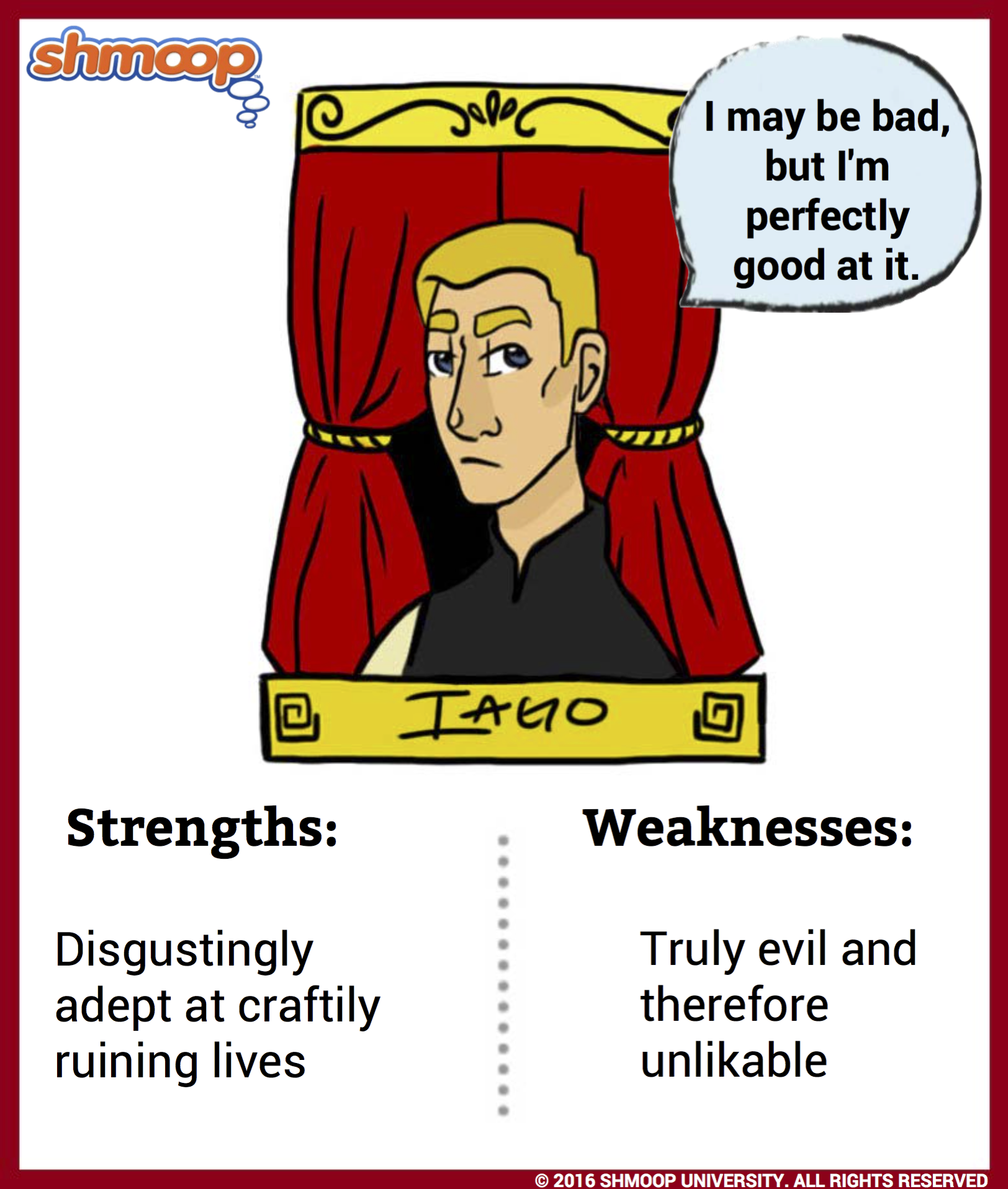Character Analysis

(Click the character infographic to download.)
Iago is one of the most notorious and mysterious villains of all time—it's no accident that the hyper-annoying and malicious sidekick to Jafar in Disney's Aladdin was named Iago.
But unlike Aladdin's cartoon parrot, Iago is nobody's sidekick. He's out for #1—and he employs every nasty trick in the book in order to reach the top.
Iago spends all of his time plotting against Othello and Desdemona, eventually convincing Othello that his wife has been cheating, despite the fact that Desdemona has been completely faithful. Iago's capacity for cruelty seems limitless, and no motivation he gives for his actions seems enough to explain the incredible destruction he wreaks on the lives of the people he knows best.
Iago as a Masterful Plotter
Shakespeare scholar Harold Bloom argues that Iago is an artist of evil. In the same way that some people enjoy writing songs or filming movies, Iago enjoys ruining people's lives.
He does it with a sense of craftsmanship, appreciating the elegance or cleverness of a particular step in his scheme as much as its final result: incredible suffering for the people he has chosen. Ever notice how he stops every time he does something cleverly evil to muse on it and tell us how awesome he is? Check it out:
IAGO
Virtue? A fig! 'Tis in ourselves that we are thus or
thus. Our bodies are our gardens, to the which our
wills are gardeners. So that if we will plant nettles
or sow lettuce, set hyssop and weed up thyme,
supply it with one gender of herbs or distract it
with many, either to have it sterile with idleness or
manured with industry, why the power and corrigible
authority of this lies in our wills. (1.3.361-368)
Exactly.
We tend to think of evil people as being brutal and insensitive, or at least disconnected from the people they hurt. Iago, however, is able to hurt Othello so much because he understands him so well. He even grows closer to Othello as his plot progresses. Iago manipulates him so expertly that at times it seems he is actually inside Othello's head.
Iago's Motives
Most other Shakespearean characters do bad things in order to achieve a particular goal. Oftentimes the culprit is ambition, as in Macbeth, or revenge, as in Hamlet. The thing about Iago is this—we never really know for certain why it is that Iago wants to destroy Othello. Throughout the play, Iago provides multiple and incompatible motives for hating Othello. At one point, Iago says he's angry because Othello passed him over for a promotion.
Later, he claims to suspect that Othello is having an affair with his (Iago's) wife (Emilia):
IAGO
I hate the Moor,
And it is thought abroad, that 'twixt my sheets
'Has done my office. I know not if 't be true,
But I, for mere suspicion in that kind,
Will do as if for surety. (1.3.329-433)
So what are we to make of this? On the one hand, we could say that Iago has no real motives—he's just plain evil.
Poet Samuel Taylor Coleridge calls Iago "a being next to the devil, only not quite the devil" and goes on to call Iago's behavior "motiveless malignity." If we agree that Iago has no real motives for hurting Othello, we could also argue that Iago's character is a kind of "Vice" figure.
So, a "Vice" figure is stock character from medieval morality plays like "Everyman." Vice figures are typically personifications of, well, vice (immoral behavior)—they tend to be tempters and often agents of the devil. (By the way, Richard III, of Shakespeare's play of the same name, is also often seen as a kind of Vice figure.) Iago is a lot more complex than most Vice figures, but we can definitely see how Shakespeare is borrowing from literary tradition.
Is Iago in Lust with Othello?
What? You don't like the "motiveless malignancy" theory? Fine. Here's another explanation that some critics like: Iago secretly wants to get it on with Othello and ends up hurting Othello because he's jealous of Desdemona.
Orson Welles seemed partial to this idea—his film version of the drama exploits the homoerotic undertones of the play, and Iago basically woos Othello away from Desdemona. If you think this idea may be worth exploring (or if you just want to know what the heck Orson Welles was thinking), be sure to check out the end of Act 3, Scene 3, where Othello makes Iago his new lieutenant and Iago vows to kill Cassio:
OTHELLO
In the due reverence of a sacred vow,
I here engage my words.
IAGO
Do not rise yet. Iago kneels.
Witness, you ever-burning lights above,
You elements that clip us round about,
Witness that here Iago doth give up
The execution of his wit, hands, heart
To wronged Othello's service! Let him command,
And to obey shall be in me remorse,
What bloody business ever.
[…]
IAGO
I am your own for ever. (3.4.523-532; 546)
This sounds a whole lot like a 16th century wedding ceremony... which definitely suggests a (one sided) homoerotic attachment between Iago and Othello.
No matter how you choose to interpret it, think about the fact that Iago is often our focus in this play. We follow his storyline more than Othello's, and we spend more time with him than Othello. We watch him in a variety of relationships—his manipulation of Roderigo, his treatment of his wife, his pseudo-friendship with Othello. If it weren't for the fact that Iago undergoes basically zero changes, you could even argue that he's the main character.